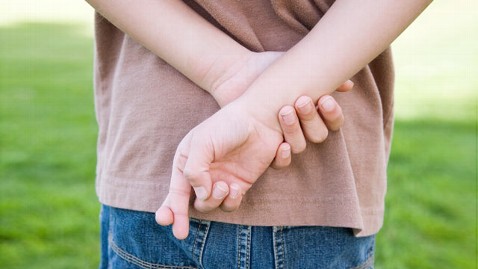Doo Doo Duplicity: When Your Child Lies
Mildly Inappropriate Mommy presents insights into kid fibbing…
“I have to poo.”
The declaration came from a small voice belonging to a 3-year-old who had just been put to bed, or so a father friend of mine tells the story. It was time for his daughter — we’ll call her Suzy — to go to sleep, but instead she announced that she needed to use the bathroom. Of course this dad wouldn’t deny his daughter her potty time, so he escorted the recently toilet-trained little one to her throne and chatted with her as she prepared to do her business.
Then he waited. And waited.
But the poo didn’t come.
No, this is not a story of constipation. This is a story of deception.
What this father soon realized was that his little angel was pretending nature had called just so she could stay up later.
I found this fascinating… and just a wee bit disturbing. A child that young being so crafty? Would her doo doo duplicity mark just the beginning of a life of skillful fibbing? Was my poor father friend going to have to invest in a polygraph machine?
I checked in with Dr. Kang Lee, the director of the Institute of Child Study in Toronto. Dr. Lee has spent much of his career studying children and lying. What he and his peers have found is that kids as young as age 2 can and do, in fact, lie. A recent (yet unpublished) study by Dr. Lee found that about 20 percent of 2-year-olds lie to cover up transgressions — ie. peeking at a toy when researchers expressly told them not to and then lying about peeking at said toy.
The proportion of liars to non-liars gets higher as children get older: 36 percent of 3-year-olds Lee tested in an earlier study lied and so did the majority — the majority! — of those between age 4 and 7.
After you’ve let these stats sink in but before you spike junior’s sippy cup with truth serum, consider this: If you child’s metaphorical pants are on fire, it could actually be a good thing.

Little lies by little kids could reflect positively on their development, researchers say. (Getty Images)
Lee and other experts have determined that if a child can lie, that means he or she is capable of understanding other people’s minds — what psychologists call “theory of mind” — and also has developed the ability to perform such psychological feats as employing a strategy.
There is one caveat that Lee is quick to point out: When children grow up in punitive environments — ie. getting pinched for peeking at that toy — they may become ready liars for the sake of their own survival, as Lee found when he tested lying in children at a West African school that endorsed corporal punishment. (Yikes.)
As for Suzy, Lee said that assuming she’s growing up in a nurturing environment, her poop excuse does in fact signify that she’s reached an important developmental milestone. What’s more, she’s demonstrated that she can lie spontaneously to benefit herself, something that researchers have yet to examine.
“We have not tried to test this issue yet because it is difficult to scientifically set it up so that we can show kids may or may not lie spontaneously,” Lee told me in an e-mail. “We would need a lot of kids.”
If it’s kids Lee’s looking for, I’m sure I can convince my father friend to volunteer Suzy. Unless, of course, she has to poo — then, all bets are off.
Read more Mildly Inappropriate Mommy:
Chasing Your Kid: Legit Workout or Wishful Thinking?